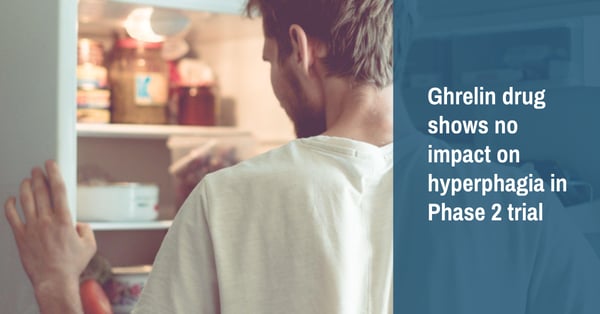Ghrelin is a small hormone produced in the stomach that stimulates increased appetite. Although it mediates other important effects, such as growth hormone release and a better ability to cope with stress, its direct impact on appetite led to it being dubbed the “hunger hormone”. Ghrelin levels normally fluctuate throughout the day, rising before a meal and decreasing after a person has eaten. Typically, ghrelin is relatively low in people who are overweight, reflecting the overly fed state of those individuals. Thus, when abnormally high ghrelin levels were first detected in PWS back in the early 2000s, it seemed logical that this might be the cause of the excessive appetite (hyperphagia) in PWS. Individuals with PWS have high ghrelin levels throughout their lives and although levels do decrease after a meal, they remain higher than typical individuals.
 Ghrelin is made in an inactive form (unacylated), and an enzyme, ghrelin‑O‑acyltransferase (GOAT), converts it to an active form (acylated ghrelin) which stimulates appetite. Because GOAT’s one and only job is to modify ghrelin, it is potentially an excellent target for drug development. The company GLWL was interested in testing a drug that could inhibit GOAT (GLWL‑01), to see if it would decrease the levels of active ghrelin and reduce appetite in PWS. The results of a Phase 2 study are now reported.
Ghrelin is made in an inactive form (unacylated), and an enzyme, ghrelin‑O‑acyltransferase (GOAT), converts it to an active form (acylated ghrelin) which stimulates appetite. Because GOAT’s one and only job is to modify ghrelin, it is potentially an excellent target for drug development. The company GLWL was interested in testing a drug that could inhibit GOAT (GLWL‑01), to see if it would decrease the levels of active ghrelin and reduce appetite in PWS. The results of a Phase 2 study are now reported.
This was a small study (19 participants) of individuals with PWS age 16‑65, who were overweight or obese (BMI 28 or above). Laboratory studies measured the change in active ghrelin levels, while the Hyperphagia Questionnaire for Clinical Trials (HQ‑CT) looked for changes in food/hunger‑associated behaviors. The study used a stringent, double blind, placebo‑controlled crossover design. “Double blind” indicates neither the participant or the study team knew if the person was getting placebo or active drug, and the crossover design had each individual either receiving drug for 28 days followed by placebo for 28 days, or vice versa.
The results of the study showed that the study drug had no safety concerns and did exactly what it was supposed to do; it was very efficient at inhibiting the production of active ghrelin, with acylated‑ghrelin levels dropping significantly (from 178 pg/mL to 13 pg/mL, which is lower than what is found in typical individuals). That’s the good news. Unfortunately, the drop in acylated ghrelin was not accompanied by a decreased appetite, nor was any weight loss observed in the study participants. Both caregivers and clinicians failed to see any improvement and it appears that GLWL‑01 by itself does not offer any benefit to those with PWS, at least not in the short term.
This study is consistent with a larger clinical trial using a different strategy to modulate ghrelin carried out by the company Millendo, which also failed to show an impact on hyperphagia in PWS. The company halted development of that drug. All in all, simply dropping the levels of ghrelin in people with PWS does not show promise in reducing hunger. It’s possible that a longer exposure or a combination with other appetite regulating drugs may result in a beneficial effect, or it could be that high ghrelin levels are a ‘red herring’ that do not meaningfully drive abnormal hunger in PWS.
Although it is discouraging that targeting ghrelin in PWS did not improve hyperphagia, this study does add important knowledge about what may or may not work to control appetite in PWS. We are extremely grateful to the clinicians, the company and especially all of the PWS families who participated in this study and helped get a solid answer about this therapeutic approach.








